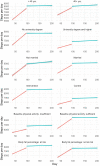How COVID-19 lockdown and reopening affected daily steps: evidence based on 164,630 person-days of prospectively collected data from Shanghai, China
- PMID: 33731132
- PMCID: PMC7968558
- DOI: 10.1186/s12966-021-01106-x
How COVID-19 lockdown and reopening affected daily steps: evidence based on 164,630 person-days of prospectively collected data from Shanghai, China
Abstract
Background: COVID-19 lockdowns may lead to physical inactivity, a major risk factor for non-communicable diseases. This study aims to determine: 1) the trajectory in daily step counts before, during and after the lockdown in China, and 2) the characteristics associated with the trajectories.
Methods: From December 2019 to July 2020, smartphone-based step counts were continuously collected in 815 Chinese adults residing in Shanghai over 202 days across three phases: before, during, and after the lockdown. Participant characteristics were reported, and height, weight and body composition measured before the lockdown. A 'sharp' regression discontinuity design with cluster robust standard errors was used to test the effect of the lockdown and reopening on daily steps and a linear mixed model was used to examine the characteristics associated with trajectories during the observed period.
Results: Based on 164,630 person-days of data, we found a sharp decline in daily step counts upon the lockdown (24/01/2020) by an average of 3796 (SE = 88) steps, followed by a significant trend of increase by 34 steps/day (SE = 2.5; p < .001) until the end of the lockdown (22/03/2020). This increasing trend continued into the reopening phase at a slower rate of 5 steps per day (SE = 2.3; p = 0.029). Those who were older, married, university educated, insufficiently active, had an 'at risk' body composition, and those in the control group, were slower at recovering step counts during the lockdown, and those who were older, married, without university education and with an 'at risk' body composition recovered step counts at a slower pace after the reopening.
Conclusions: Despite later increases in step counts, COVID-19 lockdown led to a sustained period of reduced physical activity, which may have adverse health implications. Governments and health professionals around the world should continue to encourage and facilitate physical activity during the pandemic.
Conflict of interest statement
There was no conflict of interest to declare from any authors.
Figures
References
-
- World Health Organization. WHO Director-General's opening remarks at the media briefing on COVID-19 - 11 2020 2020 [Available from: https://www.who.int/dg/speeches/detail/who-director-general-s-opening-re....
-
- World Health Organization. WHO Coronavirus Disease (COVID-19) Dashboard 2020 [cited 2020 01/10]. Available from: https://covid19.who.int/.
-
- Maringe C, Spicer J, Morris M, Purushotham A, Nolte E, Sullivan R, et al. The impact of the COVID-19 pandemic on cancer deaths due to delays in diagnosis in England, UK: a national, population-based, modelling study. The Lancet Oncol. 2020;21(8):1023–1034. doi: 10.1016/S1470-2045(20)30388-0. - DOI - PMC - PubMed
Publication types
MeSH terms
Grants and funding
LinkOut - more resources
Full Text Sources
Other Literature Sources
Medical




